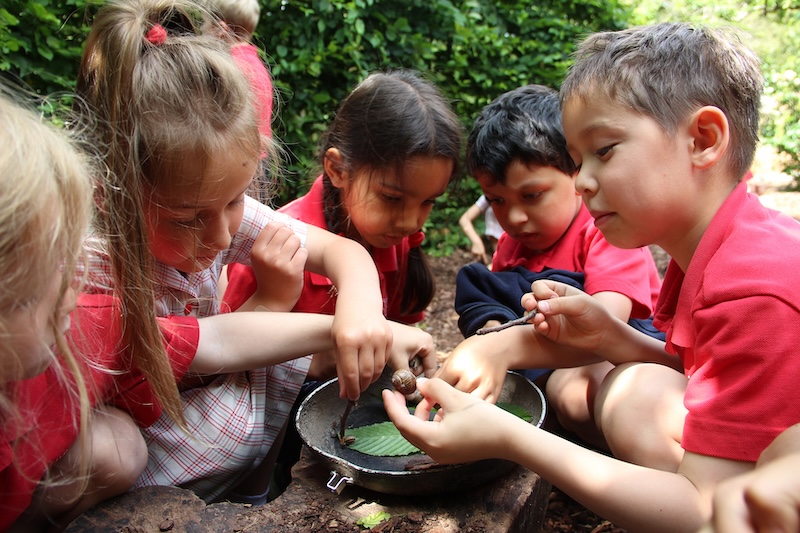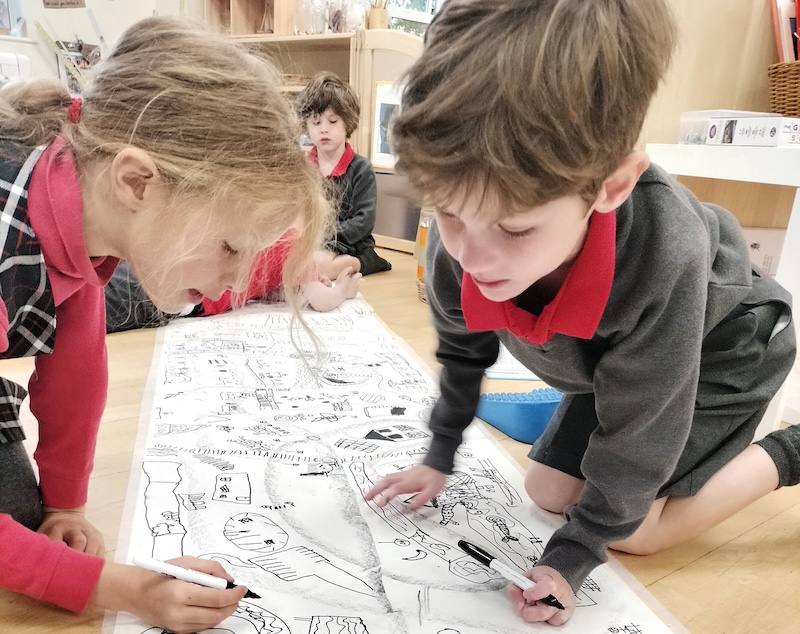The importance of play-based learning in the early years
Posted on 25th Apr 2024 in Prep Schools Guide, Early Years
Althea Pipe, Head of the Junior Department at St John’s College School, explains why learning through play is a fundamental aspect of early childhood development.
One of the core elements of the St John’s ethos is teaching and learning creatively, using the latest research into child development and teaching and learning techniques to challenge traditional methods and uncap our children’s learning. This focus on creativity can clearly be seen in our play-based learning approach in our youngest year groups (Reception to Year 2, ages 4-6). We combine our predominantly play-based learning with direct teaching in order to achieve a balanced approach.
Play enables children to make meaningful connections between everyday life and a new concept. Research actually suggests that play is the most natural way for young children to learn. For many parents embarking on the journey of education for the first time though, the word ‘play’ in junction with ‘learning’ can at first glance appear to be an oxymoron. The conventional understanding of play as unstructured time with little basis in education and learning is however quickly debunked by seeing it in action; what we might also refer to as ‘guided play’.
But what is play?
At St John’s there are five key aspects that can be used to identify whether a learning activity features an element of play: it gives the child choice, with children involved in active, engaged, minds-on thinking; it feels fun and enjoyable; it evolves spontaneity, not following a given script; it is driven by intrinsic motivation as it helps children find meaning in what they are doing; it creates a risk-free environment where children can experiment and try new ideas i.e. iterative thinking (experimentation and hypothesis testing).
So what does play-based learning really look like?
Play-based learning is a carefully planned balance between child-led discovery time, adult-initiated activities and adult-led activities. It promotes active learning, problem-solving, investigation, creativity, collaboration and reflection. It offers a risk-free environment where children can explore ideas and deepen learning through application and collaboration. It gives children a range of experiences that build connections in the brain, helping them develop physically, cognitively, socially and emotionally.
“Young children are naturally curious, and play really builds on that instinct and helps them to explore the world around them and build their knowledge and develop their skills.”

During ‘Discovery Time’, the children are given autonomy over their choice of learning activity and are encouraged to explore and discover through play. This is carefully planned for and the classrooms are resourced in such a way as to provide a safe, challenging environment that is centred around and reflects the children’s interests and enables rich play experiences and the development of skills. The adults in the classroom encourage children’s learning and inquiry through interactions that aim to stretch their thinking to higher levels. In Kindergarten, children are introduced to the idea of working in their ‘challenge zone’ and of planning their ‘next steps’ and this is continued and extended in Years 1 and 2 where the children are encouraged to explain how they have made progress and to review and reflect on their work. Time is set aside before discovery time begins for children to give some thought to what they will embark upon and purposeful play is encouraged.
Sharing times are used in each year group during or after each discovery time. The children are encouraged to share something they have been working on which is a joyous and proud moment for them. They are encouraged to reflect on their work, the difficulties encountered, what they could have done differently and their next steps. Children often become experts in their field which can stimulate and inspire interest in others and the sessions also provide good opportunities for teachers to model the language of the school’s learning dispositions or ‘Mindsets for Learning’.
What do the children gain from a play-based learning approach?
Play-based learning centres around creating open-ended opportunities which allow children to actively explore and research their own wonders. Supported by teacher guidance, active exploration helps develop children’s critical thinking, problem-solving, and social skills by allowing them to think through problems and communicate and share with others. More abstract topics become easier to understand through the context of play. It offers a risk-free
environment where children can explore ideas and deepen learning through application and collaboration. It gives them a range of experiences that build connections in the brain. Research shows that play-based learning is a model that leads to higher attainment in the long run, with children demonstrating better collaboration, independence, risk-taking, creativity, linking, motivation, problem-solving, language skills and the ability to apply the skills they have learned.
“Encouraging children to use their imagination allows them to be active agents in their own learning at developmentally appropriate stages.”
What happens when the children are introduced to more traditional teaching and learning techniques as they get older?
In relation to the traditional versus play-based debate, it is crucial to understand that children in the early years are not losing any skills by learning through play but are, indeed, developing key skills that will set them up in the future for when they find themselves in a more structured and academic environment. At St John’s, we believe play-based learning is the most effective way to prepare our youngest children for their futures by nurturing and encouraging their innate creativity, imagination, sense of wonder and curiosity and problem-solving skills.
Removing the focus from basic skills and direct instruction in the early years does not mean that children aren’t learning, or that they won’t be prepared for later years in education. In their first three years in school they learn best through interaction with peers, through manipulation of a wealth of materials, through exploration of the outdoor and indoor spaces. We believe that guided play helps these children develop the cognitive, social and emotional skills crucial for long-term school success.
This article appears in the 2024 edition of John Catt's Preparatory Schools, which you can view here: